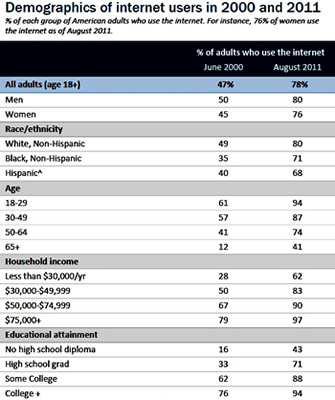According to an annual Pew Research survey, about 1 out of 5 American adults don't use the Internet. Out of that 20 percent, most of those adults believe the Internet is irrelevant to their lives while merely 10 percent of this group admit to having any online interest. The study aims to learn more about the "digital divide" and how such disparities seemingly exist along demographic lines and sub-cultures.
Of the adults who don't use the Internet, senior citizens, respondents who submitted their surveys in Spanish, individuals who didn't finish high school or those with an annual income of less than $30,000 were the least likely to enjoy Internet access.
Pew found that the digital divide is closing amongst demographic groups which have traditionally trailed in the proliferation of online access. Although ownership of Internet-capable devices is still generally linked to income, age and education, African Americans and English-speaking Hispanics are just as likely as their whites counterparts to own a mobile phone. In fact, according to the survey, those groups are more likely to use their phones for a wider range of activities.
The overall Internet adoption rate has leveled off in recent years, but adult usage has continued to grow. Once again, income, age and education all seem to play a role in determining how adults generally use the Internet.
The survey claims that 27 percent of all adults live with a disability and while only 2 percent of adults admit to having an impairment which prevents them from accessing the web, 54 percent actually go online. For those without disabilities, that number is significantly higher with 80 percent of adults cruising the net.
The survey was fielded from July 25 to August 26 last year. It was administered to 2,260 adults, ages 18 and over the phone via both landline and cellular phones. Read more about Pew's methodology.
